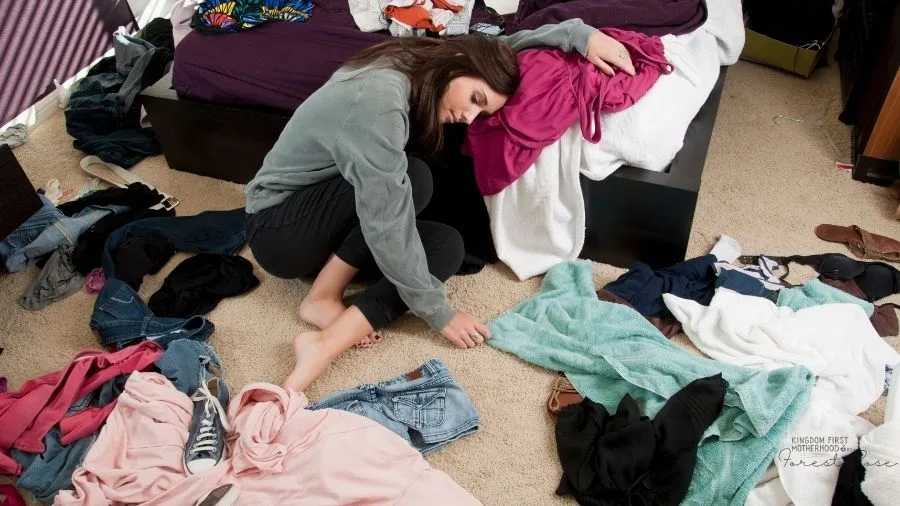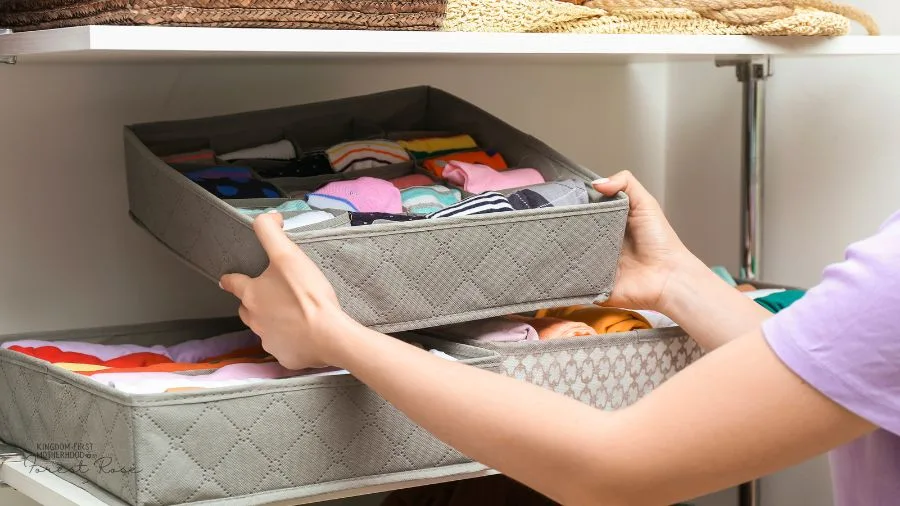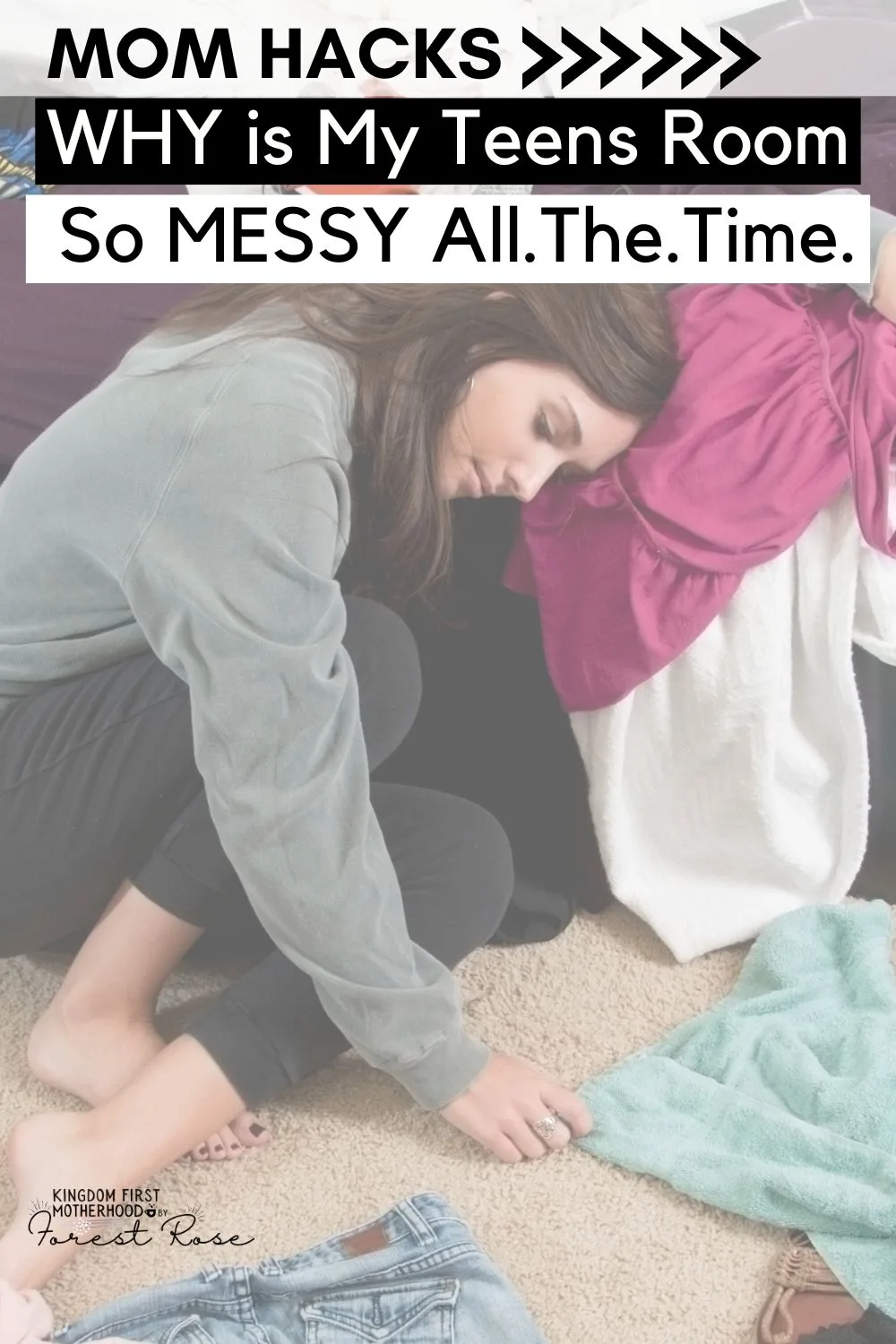Do you ask yourself, “Why is my teen’s room so messy”? Or wonder why stepping into your teen’s room is like entering a mini-disaster zone? Every time I open that door, I wonder if I’m entering a parallel universe where clothes, trash, and random stuff have minds of their own. Clean and dirty laundry blur together in a mountain on the floor and don’t even get me started on the trail of crumbs they leave in the kitchen after a “quick” lunch. I’ve tried every reminder in the book, yet somehow, those clothes still find their way to the floor like they’re pulled by some gravity I can’t understand.

When I’ve shared this with friends, I hear the same stories back: their teens are just as messy. It’s a relief in a way, but it still leaves me wondering, Is this really normal? Should I just pick my battles?
Contents
Is It Just a Phase?
Believe it or not, a messy room can be pretty typical for teens. They’re figuring out who they are and creating their own space in the world—even if it looks more like a hurricane hit it. Plus, the part of the brain that handles planning and organization, the prefrontal cortex, doesn’t fully develop until after age 20. So, I remind myself that maybe this “organized chaos” is just part of growing up.
Lisa Faguet, a licensed clinical social worker, suggests that sometimes we, as parents, need to choose our battles. Letting their room be “their mess” and simply closing the door might actually be the best move for everyone’s sanity. After all, when I step back and look at the big picture, a messy room really isn’t the end of the world.
Why Can’t They Just Pick Up?
Between school, sports, social lives, and who knows what else, my teen’s schedule is packed. I know they’re busy, but sometimes I still wonder, Why can’t they just take a few minutes to tidy up? Then I remember that their prefrontal cortex—the part of the brain that handles things like organization—isn’t fully developed. It’s like they literally don’t see the mess the same way we do. So, if I want to bring some order to the chaos, I know I need to go about it with a little empathy.
Helping Your Teen Take Ownership
If you’re anything like me and determined to tackle the mess, try starting with an honest (and calm) conversation. I’ve found that explaining why a clean space matters helps, even if they don’t seem too convinced. Setting some basic boundaries can go a long way, too—like agreeing they’ll do their own laundry or clean up after themselves in the kitchen. I try to make it more about taking responsibility than just enforcing rules, hoping it sinks in as a life skill instead of a punishment.
And I’ve learned that teens are way more responsive to positive reinforcement than they are to nagging. Instead of pointing out what’s wrong, I try to celebrate the small wins—like when they finally pick up without being asked.
A few little tools can help, too. A small laundry hamper makes it easy for them to separate their dirty clothes, and a trash can with a lid at least keeps things contained.
Is the Mess a Bigger Problem?
Most of the time, I remind myself that a messy room is just that—a mess. But if it’s causing bigger issues around the house, like attracting pests or creating clutter that’s impossible to walk through, it’s worth addressing. And if your teen’s room is so messy that it seems to affect their daily life, it could be worth digging a little deeper.
Sometimes, a teen’s so messy room might be tied to mental health challenges. I keep an eye out for other signs, like changes in mood or motivation, and remember that conditions like depression, anxiety, or ADHD can make staying organized feel impossible. If I ever think there might be more going on, I’d rather talk to a professional for guidance than let things build up.
Creating a Cleaner Space Together
When they’re open to it, I try to make cleaning feel less overwhelming by setting up storage options that actually work. Here are a few basics that help bring some order to the chaos:
- Storage Bins and Baskets
A few designated bins for clothes, books, or random gear make it easier to keep things organized. Under-bed storage bins can be great for getting things out of sight but still within reach. - Desk Organizer
If your teen’s desk is a dumping ground like mine is, a desk organizer can help keep school papers and supplies neat, at least until the next paper pile-up. - Laundry Basket with Compartments
I realized that one basket for dirty clothes wasn’t cutting it, so I tried a laundry basket with compartments to help them keep clean and dirty stuff separate. It’s not a miracle cure, but it helps! - Shoe Organizer
Shoes all over the place? A hanging shoe organizer on the back of the closet door can make it easy for them to store shoes and avoid the “missing shoe” scramble every morning. - Wall Hooks for Accessories
Hooks are lifesavers for teens with a ton of hats, scarves, bags, or jackets. They can keep everything within reach without cluttering surfaces. Adhesive wall hooks can be put anywhere without needing tools.
These tools empower them to have some control over their space. And while it’s not foolproof, I figure every little bit helps.

Encouraging Responsibility in a Supportive Way
A teen’s messy rooms can be a breeding ground for parent-teen conflicts, but there are ways to keep boundaries clear while respecting both sides. Here are some practical strategies that have helped us:
- Show Warmth and Understanding
I try to start with support, showing that I understand their space is important to them. - Respect Their Privacy
Setting boundaries that work for both of us has helped. I think they feel more willing to tidy up if they know their privacy is being respected. - Stick to the Facts
It’s easy to get emotional, but I find staying factual is more effective. I just explain why it matters and keep it simple. - Set Small Goals
Instead of demanding a complete overhaul, I ask for manageable steps, like picking up trash or putting dishes in the sink. - Be Clear About Expectations
I’m learning that it’s better to be straightforward: “I expect dirty clothes in the laundry basket, not the floor.” - Use Incentives and Consequences
I try to make the consequences natural, like if their room is too messy, they have to clean it before having friends over.
Is It a Sign of a Bigger Issue?
Sometimes, I wonder if a teen’s so messy room is just a phase or something more. If it seems to affect their overall mood or motivation, I look for other signs that could indicate there’s something else going on.
Here’s what I pay attention to:
- Changes in Mood or Energy: If they seem down or withdrawn, it might be worth talking to them about how they’re feeling.
- Difficulty Letting Go of Items: If they get overly attached to things or resist letting go, it could be worth looking into.
- Distress About the Mess: If they’re embarrassed about the mess but don’t know how to handle it, it could hint at a bigger challenge.
Tips for Keeping the Peace
Parenting a teen is all about balance. While it’s easy to focus on the mess, I try to see the big picture. Sometimes, keeping the peace means letting go of the “small stuff” and staying connected.
- Close the Door: Honestly, sometimes it’s easiest to just close the door. A mess behind closed doors doesn’t bother me as much.
- Accept Some Mess as Normal: I remind myself that a messy room is pretty common for teens. It’s their little world, and some mess is part of that.
- Use Humor and Patience: Laughing it off sometimes helps me stay sane. Parenting isn’t perfect, and some mess is just part of it.
Encouraging Habits That Stick
I try to remember that encouraging lifelong habits starts with little steps. When I see small improvements, I celebrate them, even if it’s just picking up one thing. Recognizing those tiny wins is so important—not just for them, but for my own patience, too! It reminds me that change doesn’t happen overnight, and expecting a perfectly tidy room all at once is unrealistic. So, I focus on progress rather than perfection.
I’ve found that making the process more manageable helps, like setting a weekly “clean-up day” or focusing on one part of the room at a time. If they organize just their desk or put away their laundry, I make sure to acknowledge it. Consistency is key, and gradually, they’re learning how to keep their space functional without feeling overwhelmed.
Encouraging them to keep up small routines, like tidying for five minutes before bed, can also make a huge difference. It might not transform the room overnight, but those habits start to add up, and over time, they begin to feel more in control of their space. And who knows? They might even come to appreciate a little order in their lives as they grow.
So while a teen’s room may be so messy now, with patience, encouragement, and a few helpful tools, we might just see those small wins add up to lasting habits. And maybe one day, that “disaster zone” will be a little more of a peaceful place for both of us.

For more homeschooling inspiration, tips and encouragement, make sure to follow KFH on Facebook, Pinterest, Instagram and Twitter, and subscribe to our Newsletter for some FREE GOODIES!
Forest Rose is a God Loving, Blessed Wife, & Mama to 3 girls. She’s passionate about lifting moms out of the trenches that are discouraged, overwhelmed, or feeling alone or isolated. Her hope is to point them to Christ and equip them to rise up with a newfound hope and joy within, that He alone can provide. Besides blogging, she also loves to create printables!




Leave a Reply